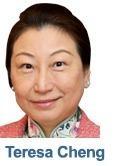The State Council published the white paper on “Hong Kong: Democratic Progress Under the Framework of One Country, Two Systems”, setting the record straight that there was no democracy under British colonial rule and the Joint Declaration does not mention universal suffrage.
On the contrary, the Central Government has been supporting the democratic development in the Hong Kong Special Administrative Region ever since our return to the motherland. Non-Permanent Judge of the Court of Final Appeal, Lord Sumption, has rightly pointed out that “the British never introduced democracy when they had the chance”.

Before our return to the motherland, the Judicial Committee of the Privy Council in London was the highest appellate court in Hong Kong and Hong Kong’s percentile rank in respect of the rule of law under the Worldwide Governance Indicators project of the World Bank Group was only 69.85 in 1996.
After July 1, 1997, the power of final adjudication is vested in the Court of Final Appeal of the HKSAR in accordance with the Basic Law which also guarantees our judicial independence.
Meanwhile, Hong Kong’s percentile rank in respect of the rule of law reached 82.5 in 1998 and has been consistently above 90 since 2003, showing that the “one country, two systems” and the Basic Law provide a solid foundation to our rule of law.
It is noteworthy that all 59 members of the Drafting Committee for the HKSAR Basic Law came from mainland and Hong Kong, signifying that we had become the master of our own destiny
Article 31 was written into the Constitution of the People’s Republic of China in 1982, forming the legal basis for the establishment of the HKSAR. The Communist Party of China and the Chinese Government afterwards laid down 12 basic policies in accordance with the principle of “one country, two systems”, ensuring Hong Kong’s smooth transition and return to the motherland.
ALSO READ: Solid constitutional basis for flourishing Hong Kong
It is noteworthy that all 59 members of the Drafting Committee for the HKSAR Basic Law came from mainland and Hong Kong, signifying that we had become the master of our own destiny. The Basic Law, which was adopted by the National People’s Congress in 1990, laid down the foundation for the democratic progress of the HKSAR, with Articles 45 and 68 clearly stipulating that the ultimate aim of universal suffrage is to be achieved in light of the actual situation in Hong Kong and in accordance with the principle of gradual and orderly process.
After the social violence in 2019, the central authorities adopted the National Security Law to restore the stability in Hong Kong, and having considered the actual situation in Hong Kong, established a new democratic electoral system with Hong Kong characteristics.
ALSO READ: HK justice chief: Need to be vigilant about judicial reform
The improved electoral system reflects not only the implementation of the principle of “patriots administering Hong Kong”, but also the features of broad representation, political inclusiveness, balanced participation and fair competition; it not only safeguards political stability, but also upholds and realizes the democratic rights of the people; it not only develops electoral democracy, but also reinforces consultative democracy.
I am confident that members of the Legislative Council will now be able to participate in policy discussions in a rational and objective manner, assisting the government in addressing social and economic issues as well as enhancing efficiency, thereby promoting good governance.
Every place has its own historical, cultural and political background. The United Nations in its resolutions repeatedly points out that there is “no single model of democracy”. In other words, there is no one panacea for all. Elections are not the only approach for a democratic system, compromise and consultation are also means to achieve democracy.
It should be borne in mind that the Communist Party of China created the “one country, two systems” policy and has guided its development ever since. As remarked by Director of the Liaison Office of the Central People’s Government in the HKSAR, Mr Luo Huining, in the Constitution Day Seminar, “disrespecting the leadership of the Communist Party of China is to forget how the HKSAR came about and deny the constitutional basis of ‘one country, two systems’ principle.”
READ MORE: Justice chief: HK legal system globally recognized
The aspiration of the Communist Party of China is to pursue the well-being of the nationals and act on the people-centered philosophy of development, which form the core components of democracy. The implementation of “one country, two systems” not only outlines a blueprint for the democratic development in Hong Kong, but also opens a new era for democracy.
The writer is Hong Kong's Secretary for Justice. The article appeared on her official blog page on Dec 21, 2021.


